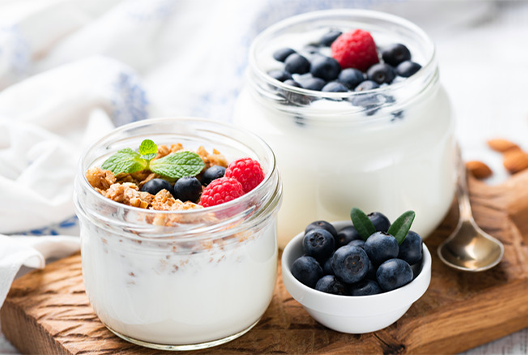
How Long Can Yoghurt Be Stored After Opening The Packaging?
Similar
Yoghurt is a nutritious and delicious dairy product that can be eaten on its own or used as an ingredient in various recipes. It is also known for its probiotic properties, which help maintain a healthy gut microbiome.
However, once you open a container of yoghurt, it is important to consume it within a certain timeframe. Here, we will explore various factors that may affect your yoghurt’s shelf life.
Factors that affect yoghurt shelf life
1. Temperature
Yoghurt should be stored in the refrigerator at a temperature of 40°F or below. If yoghurt is exposed to temperatures above this range, it can spoil faster.
2. Contamination
Once you open a container of yoghurt, it will be exposed to air and bacteria. This can increase the risk of contamination and spoilage.
3. Handling
The way you handle yoghurt can also affect its shelf life. If you use a dirty spoon or your hands to scoop out yoghurt, you can introduce bacteria that can cause spoilage.
How long can you keep yoghurt after opening it?
Generally, yoghurt can be kept for 7-10 days after opening - if stored properly. However, the actual shelf life of yoghurt can vary depending on several factors. If you notice any signs of spoilage, such as a sour smell, mold, or a change in texture, it is best to discard it.
How to extend yoghurt shelf life
1. Store it in the coldest part of the fridge
The key to extending the shelf life of yoghurt is to keep it in a cool place. The back of the fridge is typically the coldest part, so store your yoghurt there. Avoid placing it near the door or on the top shelf, as these areas are often warmer and can cause your yoghurt to spoil more quickly.
2. Use a clean spoon or spatula
When you're ready to enjoy your yoghurt, always scoop it out with a clean spoon or spatula. This will prevent bacteria from getting into the container and spoiling the rest of the yoghurt. Avoid using a dirty utensil, as this can introduce unwanted bacteria into the yoghurt.
3. Don't leave the container open
It's important to avoid leaving the yoghurt container open for an extended period. This can cause the yoghurt to dry out and lose its flavor. Always seal the container tightly after you've finished using it, and return it to the fridge as soon as possible.
4. Don't freeze yoghurt
While it may be tempting to freeze your yoghurt to extend its shelf life, this is not recommended. Freezing can change the texture and flavor of the yoghurt, making it less enjoyable to eat. Instead, focus on using up the yoghurt before it expires.
5. Don't leave it out at room temperature
Yoghurt should always be stored in the fridge and shouldn’t be kept at room temperature for more than two hours. This can cause bacteria to grow, which can lead to food poisoning. If you're taking yoghurt on the go, keep it in a cooler or insulated bag to keep it cool.
6. Consider buying smaller containers of yoghurt
If you find that you're often throwing away half-eaten containers of yoghurt, consider buying smaller containers. This will help reduce waste and ensure you're always eating fresh yoghurt. You can also buy larger containers and portion them into smaller ones to extend their shelf life.
Don’t mishandle your yoghurt!
It’s important to keep in mind that proper storage, handling, and temperature control can help extend yoghurt's shelf life. If you notice any signs of spoilage, it is best to discard the yoghurt to avoid the risk of foodborne illness.
Looking for a trusted dairy and beverage company in Qatar? Turn to none other than Baladna. With one of the largest cattle farms in the region, Baladna offers authentic, fresh, and quality dairy products. These include fresh milk, yoghurt, cheese, labneh, and many more. Contact us today for more information.



